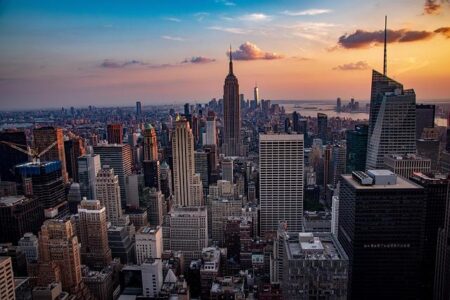Former Civil Rights Chief Condemns NYPD’s Role in FBI Surveillance of Court Observers
Andrea Mamdani, the ex-head of New York’s Civil Rights Bureau, has publicly denounced the New York Police Department’s participation in a Federal Bureau of Investigation (FBI) probe that targets individuals observing court proceedings. Labeling the NYPD’s involvement as “deeply concerning,” Mamdani’s remarks bring to light escalating tensions over law enforcement’s surveillance of those tasked with judicial oversight. This controversy raises critical issues about safeguarding civil liberties, ensuring transparency, and maintaining accountability within the justice system.
Concerns Over NYPD’s Surveillance of Court Observers
As a staunch advocate for human rights, Mamdani has expressed serious apprehension regarding the NYPD’s role in monitoring court observers amid the federal investigation. She warns that such surveillance risks infringing on the fundamental principles of judicial transparency and could intimidate individuals whose presence is vital for upholding fairness in the courtroom. Mamdani stresses that these actions threaten the essential function of court observers in promoting accountability within the legal system.
Key issues highlighted by Mamdani include:
- The problematic overlap between local police forces and federal investigative bodies.
- The potential suppression of court observers through intimidation tactics.
- The absence of explicit legal frameworks regulating surveillance of citizens attending judicial proceedings.
She calls for a thorough reassessment of existing protocols to protect the rights of court observers from unwarranted law enforcement scrutiny.
Legal Community Voices Alarm Over Threats to Judicial Transparency
Prominent legal scholars and practitioners have raised alarms about the NYPD’s collaboration with the FBI in surveilling court observers, warning that such partnerships could erode the transparency essential to a fair justice system. Experts argue that this dynamic risks creating a chilling atmosphere, deterring public oversight and undermining the accountability mechanisms that court observers provide.
Their concerns focus on:
- Chilling effect: Fear of surveillance may discourage citizens from attending or monitoring court hearings.
- Blurred jurisdictional boundaries: The merging roles of local police and federal agencies could compromise judicial independence.
- Insufficient regulatory clarity: Lack of defined limits on police cooperation in federal probes targeting court observers.
| Issue | Potential Consequence |
|---|---|
| Observer Surveillance | Discourages oversight, diminishes transparency |
| Law Enforcement Collaboration | Raises conflicts of interest |
| Judicial Autonomy | Subject to external influence |
Advocating for Robust Oversight and Clear Policies in Law Enforcement Surveillance
In response to these developments, civil rights advocates and legal experts are pressing for the establishment of stringent guidelines to govern law enforcement’s involvement in investigations concerning court observers. Without such safeguards, there is a heightened risk that police powers could be misapplied, jeopardizing the impartiality of judicial processes and eroding public confidence.
Recommended measures include:
- Creation of independent oversight bodies to supervise law enforcement activities related to court monitoring.
- Mandatory transparency regarding the objectives and scope of investigations.
- Clear delineation of responsibilities between local police and federal agencies.
- Regular audits and public reporting to ensure accountability.
| Proposed Policy | Intended Outcome |
|---|---|
| Independent oversight committees | Minimize conflicts of interest |
| Defined investigative mandates | Prevent mission creep |
| Public disclosure requirements | Boost transparency |
| External audits | Enhance accountability |
Protecting the Rights of Courtroom Observers: Calls for Accountability
Community leaders and advocacy groups have expressed deep unease over the NYPD’s role in the FBI’s surveillance of court observers. They argue that this collaboration threatens the openness of judicial proceedings and undermines public trust in the legal system. Monitoring individuals who attend or document court hearings risks deterring civic engagement and infringes upon constitutional rights.
- Fears of surveillance discouraging court attendance and observation.
- Demands for independent oversight of police activities within judicial contexts.
- Calls for explicit protections for journalists and advocates covering court cases.
Experts emphasize that unrestricted access to courtrooms is a cornerstone of democratic justice. They caution that unchecked law enforcement involvement risks shifting power away from public scrutiny toward increased secrecy. Consequently, several organizations have proposed legislative initiatives aimed at safeguarding court observers from undue surveillance and ensuring their ability to report freely without intimidation.
| Issue | Suggested Protection |
|---|---|
| Intimidation of Observers | Legal safeguards and clear procedural rules |
| Unregulated Surveillance | Independent review panels |
| Restricted Press Access | Legislative guarantees for media rights |
Looking Ahead: Balancing Security and Civil Liberties in Court Oversight
As the federal investigation into court observers continues, Andrea Mamdani’s pointed critique of the NYPD’s involvement highlights the urgent need to address the complex interplay between law enforcement and judicial transparency. This evolving situation underscores the delicate equilibrium between maintaining security and protecting civil rights. Stakeholders from all sectors will be closely monitoring the inquiry’s outcomes, seeking clarity on how future policies will shape the oversight of court proceedings and the role of police in such contexts.
Recent data from the Brennan Center for Justice indicates that public trust in law enforcement’s role in judicial matters has declined by 15% over the past two years, reflecting growing unease about surveillance practices. This trend further emphasizes the necessity for transparent, accountable frameworks that uphold democratic principles while ensuring effective law enforcement.













